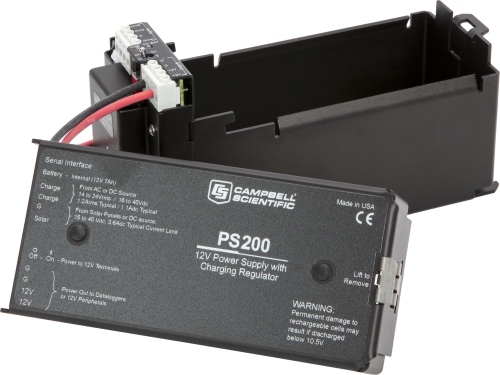Due to electronic component shortage, this product is temporarily unavailable for online quotes and orders.







Overview
The 22238 is the regulator and housing of the PS200 Smart Power Supply without the internal battery. The 22238 is a charge controller that manages amperage and voltage for safe, optimized battery charging from your solar panel or ac power source. It also measures various input, output, and status parameters to enable you to closely monitor the battery during charging and use. An external battery cable is included.
This product is designed for international shipment where the shipping costs (and regulations) associated with batteries are formidable. You must obtain a 7-Ahr Yuasa cell locally.
Read MoreTechnical Description
The 22238 orders the regulator and housing of the PS200 without the internal battery; an external battery cable is also included. This product is designed for international shipment where the shipping costs (and regulations) associated with shipping batteries are formidable. The customer must obtain a 7 Ahr Yuasa cell locally.
The 22238 is a micro-controller-based smart charger with two-step constant voltage charging and temperature compensation that optimize battery charging and increases the battery’s life. Two input terminals allow simultaneous connection of two charging sources. A maximum power point tracking algorithm is incorporated for solar inputs to maximize available solar charging resources. RS-232 and SDI-12 terminals allow the 22238 to convey charging parameters to a datalogger.
The 22238 has several safety features intended to protect the charging source, battery, charger, and load devices. Both the SOLAR – G and CHARGE – CHARGE input terminals incorporate hardware current limits and polarity reversal protection.
A fail-safe, self-resettable thermal fuse protects the CHARGE – CHARGE inputs in the event of a catastrophic AC/AC or AC/DC charging source failure. Another self-resettable thermal fuse protects the 12 V output terminals of the charger in the event of an output load fault.
The 22238 also has battery reversal protection, and includes ESD and surge protection on all of its inputs and outputs.
Images

Related Products
Compatibility
The customer must obtain a 7 Ahr Yuasa cell locally.
Specifications
| Operational Temperature | -40° to +60°C (VRLA battery manufacturers state that “heat kills batteries” and recommend operating batteries at ≤ 50°C.) |
| Weight | 376.48 g (0.83 lb) |
CHARGE - CHARGE Terminals (AC or DC Source) |
|
| AC | 18 to 24 V RMS (with 1.2 A RMS maximum) |
| DC | 16 to 40 Vdc (with 1.1 A DC maximum) |
SOLAR Terminals (Solar Panel or Other DC Source) |
|
| -NOTE- | Battery voltages below 8.7 V may result in less than 3.0 A current limit because of fold-back current limit. |
| Input Voltage Range | 15 to 40 Vdc |
| Maximum Charging Current | 4.0 Adc typical (3.2 to 4.9 Adc depending on individual charger) |
Quiescent Current |
|
| No Charge Source Present | 300 μA maximum |
| No Battery Connected | 2 mA maximum |
Battery Charging |
|
| -NOTE- | Two-step temperature-compensated constant-voltage charging for valve-regulated lead-acid batteries; cycle and float charging voltage parameters are programmable with the default values listed. |
| CYCLE Charging | Vbatt(T) = 14.70 V - (24 mV) x (T-25°C) |
| FLOAT Charging | Vbatt(T) = 13.65 V - (18 mV) x (T-25°C) |
| Accuracy | ±1% (on charging voltage over -40° to +60°C) |
Power Out (+12 Terminals) |
|
| Voltage | Unregulated 12 V from battery |
| 4 A Self-Resettable Thermal Fuse Hold Current Limit |
|
Measurements |
|
| -NOTE- | Over -40° to +60°C range |
| Average Battery Voltage | ±(1% of reading + 15 mV) |
| Average Battery/Load Current Regulator Input Voltage |
±(2% of reading + 2 mA) Impulse type changes in current may have an average current error of ±(10% of reading + 2 mA). |
| Solar |
±(1% of reading - 0.25 V)/-(1% of reading + 1 V) 1.0 V negative offset is worst-case due to reversal protection diode on input; typical diode drop is 0.35 V. |
| Continuous |
±(1% of reading - 0.5 V)/-(1% of reading + 2 V) 2.0 V negative offset is worst-case due to two series diodes in AC full-bridge. Typical diode drops are 0.35 each for 0.7 V total. |
| Charger Temperature | ± 2°C |
Resources and Links
Product Brochures
Compliance
Privacy Policy Update
We've updated our privacy policy. Learn More
Cookie Consent
Update your cookie preferences. Update Cookie Preferences
